As temperatures plummeted far below freezing in parts of Texas during February’s Winter Storm Uri, thousands of East Texans experienced a loss of access to their tap water due to broken or frozen water pipes in their homes, broken city water mains or because of boil water advisories.
But Winter Storm Uri was far from the beginning of Tyler water woes, straining an aging water infrastructure. LouAnn Campbell, City of Tyler Public Works and Utilities Public Information Officer, said Tyler Water Utilities go back over 100 years. The oldest areas of the city have the oldest water lines.
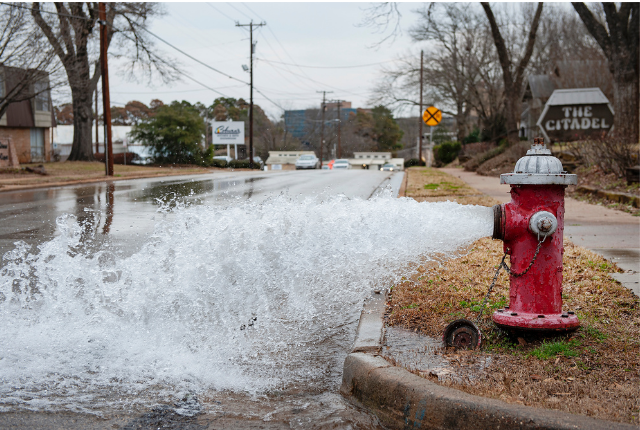
According to Campbell, the snowstorm created 111 water main breaks when temperatures dropped below 32 degrees F. “The soil freezes and the ground moves. The deeper the frost line, the more pressure on the water lines – which are more likely to fracture because low temperatures make the metal pipe more brittle,” she said.
Although seven weeks have passed since the snowstorm, Tyler resident Javier Ortiz and his family still have their water shut with no means to make expensive pipe repairs in the foreseeable future.
The storm’s damage included a health threat for some, including resident Lupe Viramontes.
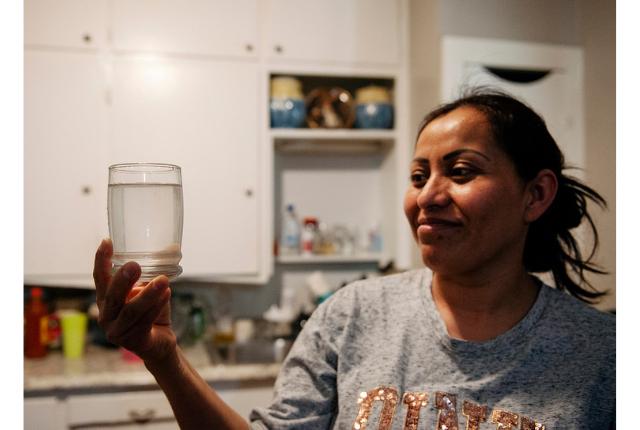
Lupe Viramontes, Tyler resident
Tyler resident Lupe Viramontes, 36, her husband and three of their children had an unpleasant experience during the snowstorm when their water led to sickness.
The Viramontes family experienced low water pressure from their faucets during the freezing weather. Lupe, who does not speak English, had not heard or seen the news about the boil water notice for residents on the City of Tyler’s municipal water page, so she and her family continued to drink their tap water as usual.
“I started to feel dizzy and sick after a few days of drinking the water,” she said. Now, several weeks after the boil water notice was lifted, the family has switched to using bottled water for drinking and cooking because the water coming from the kitchen sink looks cloudy and sometimes contains small bits of black sediment.
“After I heard about the boil water notice, I realized we had been drinking poison,” she said.
Although Viramontes is worried about her family’s water, she has not yet reported the problem to the water department. She hopes that the cloudiness will resolve itself after some time.
For some, the melting snow and defrosted pipes after the storm signaled only the beginning of their water problems. That’s when pipes burst, creating expensive repairs.
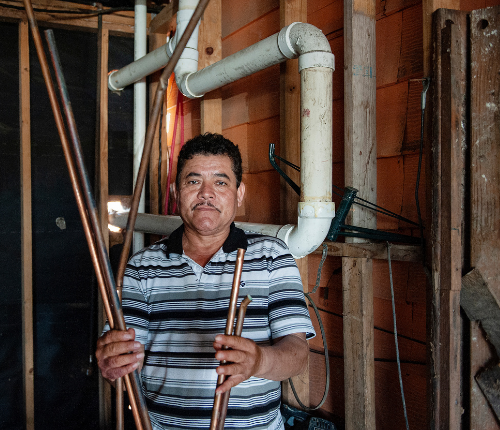
Javier Ortiz, Tyler resident
Javier Ortiz, 54, wishes he could afford the extensive plumbing and maintenance repairs his property needs after the storm.
For a month, Ortiz has been trying without success to apply for disaster relief from the Federal Emergency Management Agency (FEMA), but Ortiz only speaks Spanish. He says FEMA needs to hire more Spanish-speaking employees. Contact with the agency has been slow because of the language barrier and misunderstandings.
Ortiz owns a property with one single family home as well as a detached garage with an apartment above it, where he has lived for 30 years. His daughters, ages 14 and nine, as well as his 77-year-old mother, live on the property.
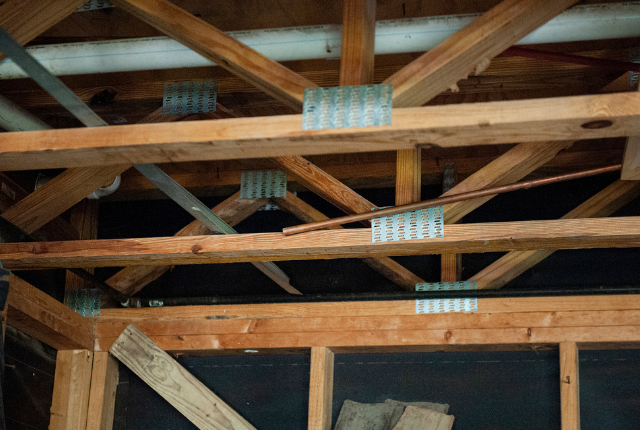
Right now, Ortiz’s water remains shut off.
At least five copper pipes broke on his property when temperatures plummeted below freezing. Unfortunately, the water was not turned off before the freeze, and both the house and apartment were flooded.
Carpeted floors soaked up the liquid mess, and now Ortiz is worried his water problem will turn into a mold problem.
“The humidity is bad,” he said. “This is the most major thing that has ever happened to me.”
Ortiz has had the pipe to the kitchen sink and to a shower fixed to make his home livable. He keeps the water turned off unless family members are using the sink or shower. Meanwhile, they drink bottled water.
Ortiz estimates he needs over $20,000 to replace all the broken pipes and fix the flood damage. His main income comes from disability, and he supplements that with a small lawn care business, but money is tight for him.
He feels that the longer he has to wait for help, the worse the problems will get. “I’m in limbo,” he said.
Some East Texans, however, were familiar with longstanding water issues long before Winter Storm Uri.

Amori Mitchell, Tyler resident
For Tyler resident Amori Mitchell, the disruption to water service in February was nothing new. She stopped drinking her tap water years ago.
“Last March I came back home from a [work] trip in 2019 and noticed my water was brown. I asked people on Facebook, ‘Is it just me, or is my water brown? Does anyone else have brown water?’
A couple of people said that they have brown water, and it is nothing new,” said Mitchell. After discovering discolored, brown water coming from her sink again in 2020, she decided it wasn’t safe to consume. Now, bottled water of various store brands and sizes line the counter top of her kitchen.
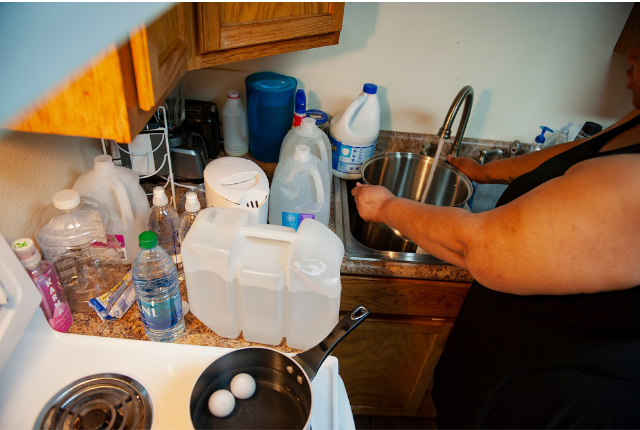
Bottled water sits in the bathroom for brushing teeth. A large pot, which takes an hour to boil when filled to the top, sits on the stove when she or visiting relatives want to get cleaned up in the bathtub.
When her nieces come to visit, they know to grab a bottle of water to pour into their microwavable ramen noodles bowl.
After meals, Mitchell fills the sink from the tap and then adds bleach and dish soap to wash dishes. Using an electric kettle, she pours boiled water over the dishes to rinse them clean.
Pink and rust-colored stains line the drains of her bathroom sinks. She recalls washing white clothes and finding the same rust coloring on them from the water.
Mitchell reached out to the District 2 City of Tyler council member in hopes of a change in her home’s water quality. “I mentioned it to the person in charge of our district, council member Broderick McGee, at a meeting with community leaders. I asked if there was a plan to fix the issue with re-election coming up,” she said.
Mitchell works as a traveling nurse. She says it’s obvious to her on visits to other cities that the water in her Tyler home is just not right.
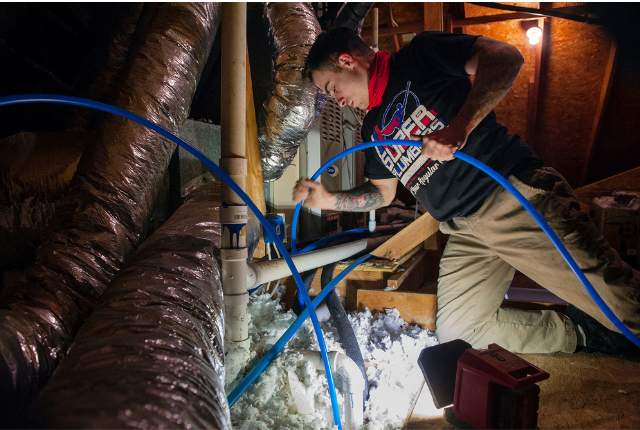
Joe Baker, Super Plumbers owner
Local plumbers hear about a lot of water issues as well and often install filtration systems for customers. Plumbers were in high demand during and after Winter Storm Uri to fix leaks at homes and businesses, including Joe Baker, a licensed master plumber and owner of Super Plumbers, servicing Smith, Gregg and Wood counties.
Baker said his staff has worked every day since the storm and remain backed up for weeks. “We have four plumbers and two apprentices, and everyone has been working between 16 and 18 hours every day,” said Baker.
“This is the worst winter storm I’ve seen, and we are still making related repairs. We are finding a lot of cracks in copper, brass and class C and B PEX [types of flexible pipes] in the exterior of the home or in the attic, which are bad places for those temperatures,” said Baker. “The building codes in Texas aren’t rated for negative temperatures. Texas just isn’t built for it.”
Baker said some of the calls for help were canceled when the pipes thawed. “If we had four hundred calls that came during that week probably about a hundred of them canceled because they just lost water because of frozen pipes coming into the house,” he said.
Baker was astonished by the temperatures, the lowest he had ever experienced in Texas. He said the oscillating low temperatures are what compromised many pipes. “It just kept getting colder and colder and then coming back up. That’s so much stress on plumbing systems,” he said.
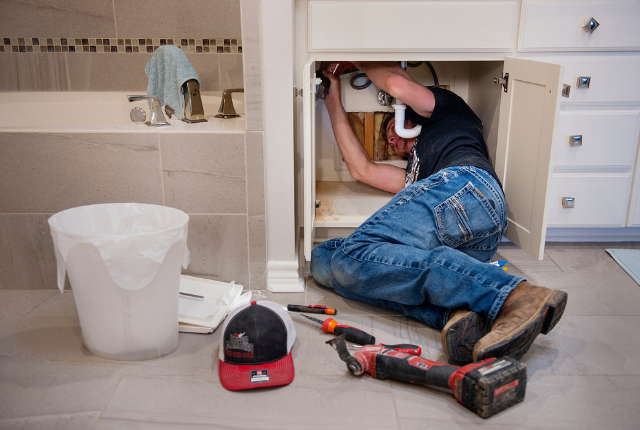
Baker and his team gave advice to panicked homeowners during the storm. “We’d recommend that they find their shut off and make sure you can turn your water off. Because when it thaws out and ruptures, that’ll be where your problem lies. We were running around turning them off, too, trying to help as much as we could. The fire department was doing the same thing. They were working as much as we were,” he said.
Baker explained that old pipes in older Tyler neighborhoods, like parts of the Azalea District and north Tyler, can cause worrisome water issues. “City repairs or old galvanized lines can cause yellow, brown or orange in people’s homes. A lot of the older districts will be piped with galvanized iron pipes so the inside will literally cause the rust color. This is common in the Azalea District,” said Baker.
Baker said problems from aging water infrastructure are more than coloration. “It also builds up on the inside so your water pressure will get really slow as well. It’s just problematic — all around a bad, obsolete pipe. But very common in Tyler because of the older districts.”
Campbell said discoloration in drinking water may be found in homes with galvanized steel pipes, particularly in Tyler homes built before 1960. “Galvanized pipes used in private homes can corrode and rust over time…causing discoloration and rust buildup that affects pressure and alters water flow,” she said. “Homeowners are responsible for the plumbing fixtures from the meter into their homes. Homeowners should contact a plumber if this is happening in their home.”
Campbell added that when a Tyler Water Utilities customer experiences discoloration or smell or taste issues, they can submit an online form or call the Tyler Water Business Office.
During the week of ice and snow and afterwards, neighbors from Tyler, Whitehouse and Chandler used the Nextdoor app to complain about chlorine or earthy smells after regaining the use of their tap water.
The smell and taste of tap water comes from geosmin. Geosmin is a naturally occurring organic compound produced by some kinds of blue-green algae, some bacteria and also some prokaryotes and eukaryotes.
Campbell said the compound can leave a flavor of beets or spinach in the water. “Geosmin is not toxic or harmful. Geosmin is extremely difficult to remove during the water treatment process. Some best practices when geosmin is noticeable are to add lemon or lime juice to the water and to use a commercial water carbon filter system,” said Campbell.
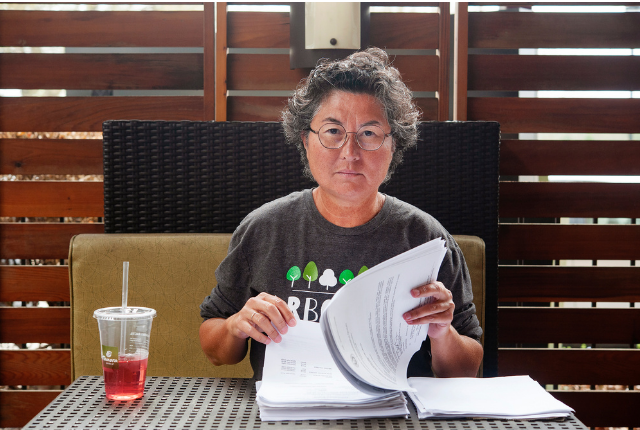
Caroline Sanchez, former city employee, former water department employee in Manatee County, Florida and government watchdog
Caroline Sanchez knows first hand about residents who complain about the look or smell of their city tap water. Sanchez, a former city employee, doesn’t drink the water.
Sanchez left her job with the City of Tyler in 2016 — in part because of her experience with the city’s lack of transparency. Afterwards, she invested her time in requesting documents from her former employer about water issues she thinks the public should know.
After Sanchez left the City of Tyler, she gave each council member a copy of a 100-page document she had gathered. “[The document] contained copies of open records requests, photos, etc. I wanted to make the council aware of what was going on, because the council might not know what the issue is with the water,” said Sanchez.
“The issue is being hidden. And it was to let the city know that I am watching you, because I think every citizen should watch what their government is doing. Water is important. If you have bad water, it could affect your health.”
Sanchez is eager for the city to go the extra step in notifying the public of water that doesn’t meet required water quality standards. “Look, we got dinged [in 2015] for haloacetic acids, but that is not what you should be worried about. We also got dinged for TTHMs (Total trihalomethanes). That may cause health risks,” she said.

In 2015, the Environmental Protection Agency filed a complaint against the City of Tyler calling for wastewater collection system upgrades, and enhanced inspections, maintenance and cleaning of the wastewater system. The city distributed a brochure to residents explaining water treatment methods.
Sanchez feels it was a bare minimum-effort and did not fully inform the public. “If the city doesn’t get caught, they don’t inform the public,” she said. “The average person doesn’t know about any of these [chemicals]. The city for full transparency should educate the public and their importance instead of sending a brochure to people’s homes which would more than likely be thrown out or recycled. Invite the media and let them know what is going on,” said Sanchez.
A separate citation happened in January of 2017 when the EPA announced penalties and agreements reached with the City of Tyler. The U.S. Department of Justice filed a complaint with the EPA alleging that, since 2005, the City of Tyler allowed and continued to allow untreated sewage to overflow from the city’s sanitary sewer system.
The city entered into a consent decree with the Texas Commission on Environmental Quality and the EPA. The city was made to pay a total of $563,000 in civil penalties for the violation. Ensuing problems including blockages in underground pipes, general system defects and power failures were cited.
Campbell maintained that Tyler water meets and exceeds the TCEQ requirements for drinking water. The most recent drinking water quality report can be found here.
Sanchez also noted other complaints and infrastructural dangers. “Here are some complaints from the Texas Commission on Environmental Quality against the City of Tyler. The city has a lot of dead ends in the water system, meaning the water line stops and the water has no way of being flushed. It should be a continuous system, a continual loop so that it gets flushed,” she said.
Campbell addressed the dead ends. “The Tyler Water Utilities water distribution system has approximately 690 miles of water lines running under City streets and right-of-ways,” she said. “We are working to loop dead end water lines.”
Sanchez called other city practices into question related to water treatment, such as water testing in schools. “When water becomes stagnant it loses its chlorine residual and it can then cause bacteria to grow,” she said.
“Tyler Water Utility celebrated 100 years, yet how many miles of those pipes have been replaced?
Campbell says that flushing is important, especially in older pipes where lines are not looped because it had not yet become an industry-standard practice when the lines were installed.
“Another best practice is our flushing program,” Campbell said. “Flushing the system cleans the water lines of sediment, clears out the water that has been sitting too long in the pipes due to infrequent use, and ensures adequate water pressure in the system.”
Sanchez said she experienced lack of transparency with the City of Tyler when it came to requesting records.
“I’ve had to fight for every single open records request I’ve submitted to the city. I do it to remind the city that they have to start telling the truth to the people; you serve the people of Tyler. We, as a society, have to watch the government so they don’t pull crap on us, remain truthful and remain serving the public,” said Sanchez.
Thanks to his decades in the filtration business, Skip Inks, owner of New Visions Water Filters, is familiar with local municipal water complaints from residents and water cleaning processes in Tyler and abroad.
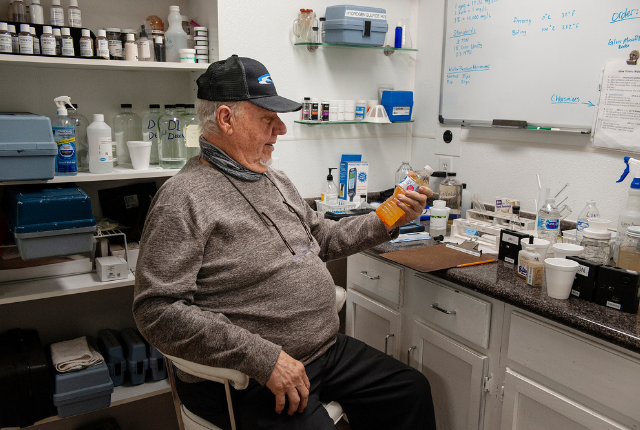
Skip Inks, New Visions Water Filters owner
“We’ve been in the water business for about 36 years. When we find a problem we also have a lab, so we can test the water and find what’s in it. We have media (which separates unwanted particles) and filters, and we custom build the filter to take care of the problem found in the lab test,” said Inks.
Inks says most customers using municipal water want chlorine or chloramines taken out. “Customers tell us, ‘I take a shower and the smell isn’t so good and I can’t hardly breathe from the chlorine,’” said Inks.
Inks explained that water sources are as unique as snowflakes. “All utilities get their water from somewhere. I think Tyler has 12 wells around town, plus Lake Tyler, and we buy water from Lake Palestine. All these sources have a different footprint or makeup.
“For instance, different wells might have tannins or copper or iron, or even chemicals — organics or inorganics. If you have 12 wells, you probably have 12 different footprints,” said Inks.
About the city’s water chlorination, Inks said, “The homes closest to the [water] plant are going to get the most chlorine and then it dissipates the farther out the water supply goes. That amount of chlorine can be very pungent depending on where it’s at in the water supply.”
Inks said not everyone uses primarily chlorine to disinfect water. “In Europe, water utilities use ozonation (a gas) for disinfection, and here, we use chlorination. There is a dispute over which process works the best,” he said.
Inks says that boil notices can come late, days after pipes are broken. “You can install a whole house reverse osmosis system so you don’t have to worry about your water, ever — even under boil water notices.”
Inks said that a bill has been introduced in Congress to create a federal loan program for low-income people in the United States to receive funding for a reverse osmosis system in the home.
Inks’ training and experience have made him skeptical of municipal tap water. “If you saw the city pipes that your water runs through, you would throw up on the spot. The water is not running through some pristine PVC pipe. I became a realist a long time ago. I encourage people to do their own research because the answers are available,” he said.
Campbell said the majority of the city’s water mains are cast iron along with some galvanized steel and a small amount of PVC. “The galvanized steel lines are limited and are already part of a Capital Improvement Program for replacement,” she said.
Campbell said revamping Tyler’s water infrastructure would be a costly feat. “We often get the question, ‘How much would it cost to replace our entire distribution system?’ That cost is estimated to be about $7 billion,” said Campbell.
As for Tyler Water Utilities’ plans to improve the current system, through which 24.253 million gallons a day flow on average, Campbell said, “We have a water line distribution replacement program and are working on replacing older lines and looping more dead end lines.”
Deep Indigo Collective is a visual storytelling resource supporting news outlets reporting on the local impacts of environmental threats and the climate crisis. As a 501(c)(3) organization, Deep Indigo is proud to produce original visual journalism on behalf of our editorial partners across the United States.
Sarah A. Miller is an independent editorial photographer and journalist with over 10 years of experience in newsrooms across the country. She lives in Tyler with several roommates and three quirky cats. Sarah loves being a community storyteller and getting to document the everyday lives of people in East Texas.
Love what you're seeing in our posts? Help power our local, nonprofit journalism platform — from in-depth reads, to freelance training, to COVID Stories videos, to intimate portraits of East Texans through storytelling.
Our readers have told us they want to better understand this place we all call home, from Tyler's north-south divide to our city's changing demographics. What systemic issues need attention? What are are greatest concerns and hopes? What matters most to Tylerites and East Texans?
Help us create more informed, more connected, more engaged Tyler. Help us continue providing no paywall, free access posts. Become a member today. Your $15/month contribution drives our work.







